At the risk — yet again — of being branded a curmudgeon, I find it amuses me to address the subject of what seems to me the dearth of much in the way of good comedy at the movies. This has been simmering on the back burner of my brain ever since I ran Animal Crackers (1930) for Justin Souther and a few other friends a few months back. Justin, who is far from curmudgeonly age, and in the process of catching up on 70 or 80 years worth of cinema (I’ve yet to break it to him that this is an inexhaustible — if sometimes exhausting — undertaking).
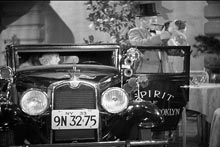
Part way through this somewhat clunky, very old movie (it was only their second film), Justin asked me, “Are all their films this good, or do they fall off as they go along?” Heaving that sigh of relief that always accompanies the moment when you realize that you haven’t made a mistake by introducing someone to something you love (hey, a prime factor in one of my early break-ups had to do with the fact that she didn’t like the Marx Brothers or the Beatles), I explained that the first five of their films were pretty much golden. After that, it’s a little more hit and miss — something I blame on the movies themselves more than the Marxes.
One thing led to another — as one thing is wont to do — and over a period of time several discussions ensued about the lack of really good comedies on movie screens today. Now, before everyone starts screaming about movies like Hot Fuzz (2007), I’m not saying that there’s no good comedy out there, but that the bad — and the flat-out dreadful — far outweighs the good, especially when it comes to the folks who specialize in comedy. When your top comedic performers are Adam Sandler, Mike Myers, Will Ferrell, Jim Carrey and such hangers-on as Eddie Murphy and Robin Williams, it’s understandable that the occasionally amusing crudities from the Judd Apatow factory (which is not exactly un-associated with some of this other stuff) are taken for great comedies.
I’ll go further and say that, yes, everyone on that list has done good work, though it’s usually when they step out of their usual range and tackle something else. Further, I’m not making a case that things were so much better “in my day.” In some ways, it was. We did have the antic movies of Richard Lester, who found (and helped create) something like his own Four Marx Brothers in John, Paul, George and Ringo. And we had Peter Sellers, whose work was uneven, yes, but at its best was something to behold. But, yeah, we also had Jerry Lewis still hanging around and Beach Party movies.
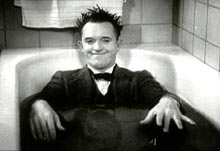
Far and away the biggest thing we had was a lack of prejudice on the score of the age of a movie — and whether or not it was in color. Hell, in some cases, we didn’t even care if a movie had sound. Unthinkable, I know, but it’s true. And, yes, I’ll admit that a lot of this — at least as concerns how we were exposed to it — was situational. When you start your viewing life with black and white TV, three or four channels and no such thing as home video, you get exposed to lots of things you might otherwise pass up.
There’s probably more to it than that, of course. Anyone of tender years and a scintilla of rebellion was not only ripe for the cheerful anarchy of Lester and the Beatles and the scattershot satires of the 1960s after the fairly dismal 1950s, but was left with an appetite for more. Doris Day movies and Lana Turner weepies will do that to you. The manic anti-status quo world of the Marx Brothers, the very peculiar world of Laurel and Hardy, the overt sexuality of Mae West, the humanist and political humor of Charlie Chaplin, the genial misanthropy of W.C. Fields and, believe it or not, the snappy wisecracking of Bob Hope were just lying there waiting to seduce us. And they did.
Now, I’m hearing muttering from some corners about the fact that Abbott and Costello aren’t on my list, but I’d be lying if I said I found them especially funny much after the age of 12. They always seem more loud than actually funny, and all but a very few of their movies have an assembly line feel to them. Moreover, I find nothing liberating about them. I think there’s more depth in the works of the Three Stooges, whose films at least occasionally flirt with a kind of anarchic surrealism.
Rather than talk in broad generalities, let’s look at a few specific instances of these folks and the films I’d label classic comedies.
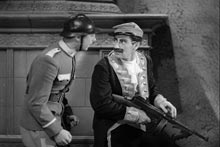
At the top of my list — perhaps because they’d have been at the top of any self-respecting young cinephile’s list ca. 1970 — are the Marx Brothers, especially in their incarnation as the Four Marx Brothers. The original movie team consisted of Groucho, Harpo, Chico and Zeppo. Zeppo, alas, bailed on his brothers after their fifth feature Duck Soup in 1933. This wasn’t a major tragedy, because Zeppo didn’t bring much to the group apart from bland good looks, a pleasant personality and singing voice, and the fascinating ability to put the emphasis on all the wrong words every time he delivered a line of dialogue. (Supposedly, he once went on in Groucho’s role during a performance of Animal Crackers and no one noticed the difference. It seems unlikely, but it’s a good story.) Still, I like Zeppo. Plus, he’s got the coolest name of them all.
The concensus is that Duck Soup is the Marxes’ best film. I won’t really argue that. Its appeal is immediate. It runs a fast 70 minutes. It doesn’t stop for Chico to have a piano solo or Harpo to cut loose on the harp (to the degree that one can cut loose on a harp). The gags are non-stop, and it’s a good-looking production (thanks in no small part to sets left over from larger Paramount productions). It’s also the only of their films not directed by — for all intents and purposes — a hack. Leo McCarey handled this one and it shows.
Plus, it plays very nicely as an anti-war film — something that had a lot of cache during the Vietnam era when it found its late-in-the-day popularity. The movie mocks just about everything you care to name in that realm. Patriotism becomes mindless jingoism as the populace of Freedonia celebrate the fact that they’re going to war (over the silliest of reasons) and ape everything the Marxes do, no matter how ludicrous, in a production number where the Brothers sing, “They got guns. We got guns. All God’s chillun’ got guns. Gonna march all over the battlefield ‘cos all God’s chillun’ got guns.” The president of Freedonia (Groucho) inadvertently machine guns his own men, then offers Zeppo five dollars to keep quiet about it, only to decide to keep the money. It’s bitter, brilliant, endlessly inventive and very funny.
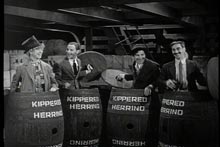
However, look beyond Duck Soup. Pick any — especially the last three — of their Paramount films and give it a try. Personally, I think I’d go with Monkey Business (1931), which finds the Marx Brothers as stowaways (in individual barrels labeled “Kippered Herring”) and offers only the slimmest of plots. In some ways, this may be the Brothers at their purest. They create havoc on board the ship for no very good reason except that it suits them to do so. They barge into one situation after another, invariably defying the straight world to notice them. And the joke is that it usually doesn’t. When they’re on the run from the ship’s captain (who seems more annoyed by the fact that Groucho has sent him an insulting note than anything else), they pause to pick up a band’s musical instruments and launch into the most out-of-tune cacophony imaginable. What do the other passengers do? Why, they politely applaud, of course.
The film’s highlight of insanity — and its strongest comment on the lack of observation — comes when Zeppo steals Maurice Chevalier’s passport (off-screen) and all four of them plan to use it to bamboozle the officials and get off the boat. Despite the fact that none of them bear even a passing resemblance to Chevalier (and jutting out their lower lips doesn’t help much), they harbor the interesting notion that if they sing one of Chevalier’s songs they can pull this off. So each in turn walks up to the official and launches into “You Brought a New Kind of Love to Me” — making no actual attempt to sound like Chevalier. Harpo comes nearest to succeeding — thanks to a gramophone with the Chevalier record strapped to his back. The wary official looks back and forth at Chevalier’s passport picture and Harpo, trying to reconcile the photo and the voice. Unfortunately, the gramophone winds down and chaos follows. The point is that the plan fails on the very idea that the Marxes thought it would work because they can’t sing like Chevalier. Officialdom can’t be fooled that way, but it never stops to question the existence of four Maurice Chevaliers.
There’s something similar in the world — and it really is a separate world — of Messrs. Laurel and Hardy. They inhabit a realm where policemen follow folks around and carefully watch all manner of obviously suspicious activity — and occasional outright perfidy — without seeming to take in the evidence of their own eyes. However, the Boys — as their fans call them — otherwise have nothing in common with the Marx Brothers. There’s an inherent sense of the pair as a couple of nice guys, who simply get into trouble either through some fairly childish misadventure, or by trying to help someone.
Laurel and Hardy are the epitome of male-bonding. In their world, wives are little more than glorified mothers. They exist mostly to keep the Boys from having — generally innocent — fun, and they exist to be hoodwinked. The problem is that the wives are invariably smarter than Stan and Ollie. And, yes, if you want to go there, there’s a raft of subtext in all of this — something that always gets a rise out of a certain contingent of fans if you dare to bring it up.
The problem with not bringing it up is that it’s occasionally inescapable. Take their 1932 short (the best of their films are the shorts) Their First Mistake. The film is driven by Stan having won tickets to the Cement Workers’ Bazaar and inviting Ollie on the strength of the idea that they “might win a prize — they’re giving away a steamshovel.” Ollie has to lie to the wife (Mae Busch) in order to go. Of course, the truth comes out and the duo end up imprisoned in the bedroom like naughty children. When Stan wonders why Mrs. Hardy is so mad, Ollie tells him, “She says I think more of you than I do of her.” Stan considers this for a moment and, with a degree of shock that it could possibly be otherwise asks, “Well, you do, don’t you?” To this, Ollie responds, “Well, we won’t go into that.” Later, Mrs. Hardy leaves and sues Ollie for divorce — and Stan for “alienation of affections.” Nope, no subtext there.
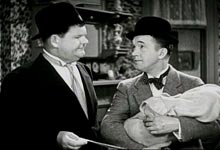
Their First Mistake is a good, but somewhat uneven film that doesn’t so much end as just stop. If I were to pick a Laurel and Hardy essential, it would be Come Clean (1931). This is also a domestic comedy, but one that finds Ollie unusually happily married to Gertrude Astor, with whom he’s looking forward to a quiet evening at home without “those Laurels.” Naturally, “those Laurels” show up and attempts to pretend that they’re not home come to disaster, followed by much forced good-fellowship.
It’s not long, however, before it becomes the Boys vs. the Wives when Stan and Ollie play good Samaritan and rescue an attempted suicide (Mae Busch), who turns out to be a hooker (without a heart of gold) who is not in the least grateful. “You’ve got a lot of nerve butting into other people’s affairs,” she tells them and then announces, “Well, now that you’ve saved me, you can take care of me.” The problem is that they know and the hooker knows and knows they know that the Wives aren’t going to buy the innocence of the whole thing. It all works spendidly and boasts one of the best endings and best ending lines of any of their films.
To balance things out a bit with the woman’s point of view there’s Mae West — one of the most unlikely performers ever to come along. West was nearly 40 when she made her film debut — and possessed of a figure that came close to what we call Rubenesque. This didn’t keep her from becoming the sexiest thing in movies — after her own fashion. From the moment she walked into Night After Night (1932) and a cloakroom girl enthused, “Goodness! What beautiful diamonds,” earning West’s blunt response, “Goodness had nothin’ to do with it, dearie,” she was a hit. She took sex out of the bedroom and kidded it openly. She was the aggressor and made no bones about it — nor about her character using sex to get what she wanted. In her first starring film, She Done Him Wrong (1933), someone calls her a “fine woman.” Without a pause, she adds, “One of the finest women that ever walked the street.”
Thank God, Mae West got to the movies when she did. Not only did She Done Him Wrong save Paramount from bankruptcy, but she arrived just in time to sneak in under the Production Code wire. By 1934 she would find herself hampered by the dictates of the Breen Office and its myriad of “Thou Shalt Nots” where the movies were concerned. By her fourth movie, Belle of the Nineties (1934), she was considerably toned down. In fact, the film’s original title, It Ain’t No Sin, was deemed unacceptable — something that left the Paramount publicity department stuck with a hundred parrots that had been taught to say, “It ain’t no sin,” on cue.
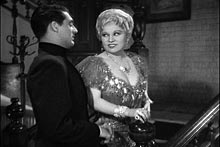
West worked around the Code as best she could — and she was pretty good at it, because a lot had less to do with what she said than with the way she said it. Two of her films, however, She Done Him Wrong and I’m No Angel (1933), made it through pretty much unscathed. She Done Him Wrong is probably the better of the two. It’s more stylishly made and it’s more compact.
Based on her play (West wrote her own material) Diamond Lil — the title and the character name were on the banned list, but not the plot — it presents West as the mistress of an 1890’s saloon owner and career criminal (Noah Beery, Sr.). She’s strictly and brazenly in it for the money. Her romantic interest centers on Captain Cummings (a very young Cary Grant) who runs the Salvation Army Mission next to the saloon. Cummings pretends not to notice that she’s coming onto him, but Mae West is an unstoppable force of sex. “Why don’t you come up sometime and see me?” she asks. (Her catchphrase, “Come up and see me sometime,” didn’t crop ups in that form till I’m No Angel.) He claims he’s busy, but she won’t be disuaded. “Come up — I’ll tell your fortune. Oh, you can be had,” she tells him sashaying up the stairs. And, of course, that’s true, though it works out in a more or less moral way. That moral way, however, has to wait till West has killed a woman, set up an old boyfriend to shoot an unwanted suitor and sung the notorious “I Wonder Where My Easy Rider’s Gone.”
Charlie Chaplin is in a class by himself. He’s a mix of low comedy, pathos and social critique. Of course, he dates back to 1914 in the movies and the full-flowering of his unique blend came later. All the same, elements of that more mature artist crop up early on. The sentiment is there as early as The Tramp (1915), while social criticism certainly rears its head in The Immigrant (1917). In one of the short film’s best remembered scenes, Charlie — in the title role — casts an askance look at the Statue of Liberty when he finds himself and his fellow immigrants herded like cattle by the authorities.
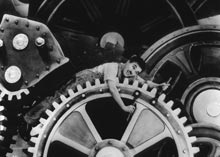
I think the film that most directly spoke to the audiences of my generation was Modern Times (1936) — Chaplin’s last non-talkie (he does sing a gibberish song near the end). Though very funny, it was a deliberate slap at modern society. In fact, the film opens by equating factory workers with sheep being herded. The workplace is an inhuman technocratic nightmare — one that finally drives Chaplin’s character insane and gets him arrested when he tries to use his wrench to tighten to the buttons on the front a woman’s dress.
For the early 70s filmgoer there was the added surprise of a sequence where Chaplin inadvertently becomes a hero because he’s accidentally high on cocaine. In fact, most things that happen to him are accidental — including the scene where he picks up a red flag that falls off the end of a truck and uses it to try to attract the driver’s attention. Instead of that, however, he inadvertently finds himself leading a left-wing parade, which lands him in more trouble with the law. Considering his future troubles with the House UnAmerican Activities Committee and him being taken up by the rebellious-minded counter culture of the 60s and early 70s, it’s a significant moment. Yet it’s also clearly accidental — a gag that happens to have paid dividends years later.
Perhaps no classic comedian, however, tapped into the consciousness of a later generation more than W.C. Fields. To some extent, this is almost a misunderstanding, because it’s less Fields’ movies that held the appeal than it was Fields’ persona. Some of his films are indeed as cynical and distrustful as that persona suggests, but many of them have their share of sentimentality — which isn’t a bad thing, since it tempers the image a little, modifying what otherwise might seem like sheer cruelty.
With Fields you can take your pick from a variety of styles. There’s the satirical Million Dollar Legs (1932), which is a little like an incipient Duck Soup, but badly compromised by a truly flat ending. Or for a wholly unsympathetic Fields, there are the delights of International House (1933), a 70 minute extravaganza with tons of guest stars, musical numbers and a thin plot with Fields becoming entangled with Peggy Hopkins Joyce (a kind of more appealing Paris Hilton of the era, whose specialty was marrying millionaires), much to the ire of jealous ex-husband Bela Lugosi. It moves like lightning and the musical acts are often good (Cab Calloway shows up to perform “Reefer Man”). It also had a profound impact on the birth of hard censorship with its cellophane-wrapped chorus girls, sex jokes, and the moment where Fields extricates a cat from beneath Peggy Hopkins Joyce and gleefully exclaims, “Ah! It’s a pussy!”
Really no assessment of Fields is complete without considering his bizarre short film, The Fatal Glass of Beer (1933), which may be the first post-modern film (before anyone knew what that was) of the sound era. (Will Rogers made some silent shorts that qualify.) It deliberately presents itself as a movie — a defiantly unbelievable one. There is no attempt at realism — the film dares you to try to believe it. Bad rear-screen photography is made just that much worse by never being in scale (to judge by the film, Fields has a herd of giant reindeer). The whole thing is set in the frozen north, which allows Fields to wander to the door of his cabin every so often, open it, say, “And it ain’t a fit night out for man nor beast,” followed by a handful of fake snow being thrown in his face. The humor is odd to say the least. At one point, Fields brags that a creditor won’t get the lead dog from the sled team because “I et him. He was mighty good with mustard.” In 1933, it was a disaster. One theater owner even wrote to Paramount asking them to please not send him “anything like this again.”
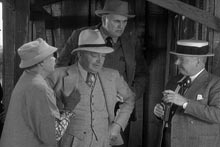
The softer — more accessible in many ways — Fields can be found in films like It’s a Gift (1934), which is usually called his best film. If it’s not, it’s in the top two or three. Here he’s a hapless grocer named Harold Bissonette (his snobbish wife, Kathleen Howard, insists it be pronounced “Bis-o-nay”), who sinks an inheritance in a worthless California “orange ranch.” It’s all prime Fields, which is to say it’s messy, barely structured and filled with wonderful asides. Plus, it has the now venerable exchange where someone tells Fields, “You’re drunk.” Fields admits the distinct possibility, but counters, “And you’re crazy. I’ll be sober tomorrow and you’ll be crazy for the rest of your life.” Who can dispute it?
The last comedian I’m going to bring up is Bob Hope. I can hear the groans now, but get the notion of Bob “TV personality” Hope out of your minds. Forget the fact that Hope’s last really good film was Son of Paleface in 1952, his last marginally passable one was Call Me Bwana in 1963, and ignore his unfortunate insistence on continuing to make the damned things through 1972. Go back to Hope in his prime with movies like The Ghost Breakers (1940) or My Favorite Blonde (1942). These are revelatory. This Hope is a sharp guy. He’s quick with a wisecrack, unfailingly anti-establishment and an all around terrific performer. Even when a line is scripted, Hope can make it sound like an ad-lib. He’s also a sucker for a pretty girl or a get-rich-quick scheme, and he’s a professional coward. Woody Allen’s screen persona owes much to Hope.
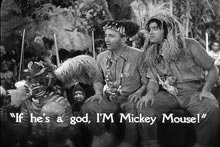
There’s a large catalogue of Bob Hope pictures to choose from, but you have to include a “Road” picture — one of the series of movies he made with Bing Crosby and Dorothy Lamour. I’ll go with the second one, Road to Zanzibar (1941), which is both a great “Road” picture and a solid satire of the African adventure movie. Rather than present Lamour as her usual phony exotic character, the film casts her as one half of a Brooklyn singing act promising “two girls and a guitar,” who, like Bing and Bob had found herself stranded in Africa. In essence, everyone is out to fleece everyone else with Hope getting the lion’s share of the fleecings — including wrestling with a gorilla when he and Bing get captured by natives, who endlessly bicker (via subtitles) over whether or not the duo are gods (“If he’s a god, I’m Mickey Mouse” reads one improbable translation).
The Hope-Crosby relationship is not wholly dissimilar to that of Laurel and Hardy — subtext is ever-present, and, in fact, they even end up married to each other in 1952’s Road to Bali (“One of us has to go to Reno before [gossip columnist] Louella [Parsons] finds out”). But they differ in that their not so innocent. The relationship is built on double-crossing each other — especially over women. The problem is that Hope isn’t very good at it, while Crosby is an effortless master.
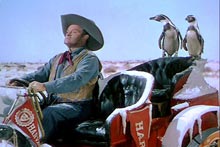
In a different mode, there’s always Son of Paleface, which — for those who insist — has the bonus of being in color. As directed by Frank Tashlin, the film is about as close as a live action film can get to being a cartoon. It’s wild stuff right from the beginning with Hope graduating from Harvard (class of 1895) magna cum laude. (The improbability of Hope graduating at all is stressed when he tells the audience that magna cum laude is “Latin for ‘if you folks drive home after the picture, be sure and use a car.”) The film is a sequel to the much more sedate The Paleface (1948), and it truly showcases Hope at his best.
I’m going to leave it there — and await the wrath over having left out Buster Keaton and possibly even Wheeler and Woolsey — but I really suggest that readers check out some of these films and these performers. I think you might be surprised at how short-changed we’re being today. And notice one key factor about these “golden age” comedians — at no time do they beg for laughs (Hope comes close on occasion, but never crosses the line). There’s not a moment in these films where you get the sense of the performer screaming, “Hey! Look at me! Look! I’m being funny now! See?” — and that’s the thing (even more than flatulence gags and penis jokes) that really sinks so much current comedy for me.
— Ken Hanke




>>Part way through this somewhat clunky, very old movie (it was only their second film),
You know the “their” is the Marx Brothers…. anybody else know that?
You know the “their” is the Marx Brothers…. anybody else know that?
Pretty obviously you do, though I grant you it’s a flaw, which I’m sure brightened your day considerably.
Ken, some great photos there. I love comedy films the most. Laurel & Hardy, The Three Stooges, Bob Hope, and on and on. Love the classics.
Yes, where is the comedy movie equal to Caddy Shack?
Yes, where is the comedy movie equal to Caddy Shack?
While I wouldn’t personally include Caddyshack on a list of great comedies, it’s certainly one that probably gets there by default when put up against things like Date Movie, Epic Movie, The Love Guru, You Don’t Mess with the Zohan, Good Luck Chuck, Blades of Glory and on and on.
I should note that there are good comedies being made. Woody Allen’s last three straightforward comedies weren’t bad, for example. And there was Edgar Wright’s Hot Fuzz. A case can certainly be made that Wes Anderson and Michel Gondry make comedies, but they’re a very different kind of comedy than the comedies that were designed to play on the screen personas of specific comedians.
“Yes, where is the comedy movie equal to Caddy Shack?”
I hope when i’m 60 i wont think ‘the 40 year old virgiin” is a “classic”, but then again, i guess classic only means ‘old’ in this sense anyway.
I hope when i’m 60 i wont think ‘the 40 year old virgiin” is a “classic”
Well, I’ve only got about 6 and a half years till attaining 60-dom, but I can pretty much guarantee I won’t be called 40-Year-Old Virgin a classic then.
i guess classic only means ‘old’ in this sense anyway.
Somewhere in this world, someone is calling Martin and Lewis in The Caddy a classic perhaps as we speak. Well, it’s old.
Of course, you’re wise to revive those comedic performers & acts that you identify with – made you smile, chuckle, belly laugh. They’re more interesting for reading why they made you laugh, than didn’t.
In the spirit of discourse, though, no more acknowledgement of Martin & Lewis and their place in the context of this bygone era of comedy films? If memory serves me correct — and I think that it does — you’re less than a ‘fan’ of their work – understandable – but not even a tip of the hat? Jerry Lewis’ idiotic pratfalling is not for everyone’s tastes, unless you’re French. Agreed. Truth be told, I don’t find their movies all that particularly funny. Their popularity, in their prime, however, warrants at least some background offering and interpretation. Together for 10 years, for better or worse, they were the kings of entertainment in the early ‘50s. They made 17 movies together.
If you’re still in disagreement, and, somehow, I think you still are, then how’s this for my last, and best effort, at a pitch: There are three great, really great, ‘straight’ men in the history of American comedy: Bud Abbott, George Burns, and none other than Dean Martin. Martin’s comic timing is unrivaled. Is this even debatable? And, I might add, as an aside, the only comedic titan that was an accomplished actor in his own right — and, of course, a great singer — having acted to respectable effect opposite the cinematic titans of his day such as Brando, Wayne, Stewart, etc.
Well done piece.
Their popularity, in their prime, however, warrants at least some background offering and interpretation. Together for 10 years, for better or worse, they were the kings of entertainment in the early ‘50s. They made 17 movies together.
In historical terms, this is undeniable. But how well have these films held up? You could make a similar case for Francis the Talking Mule movies, which were also immensely popular in the first half of the 50s, but count for little besides simple nostalgia today. I’d say that Martin and Lewis have not stood the test of time. Even Lewis’ French admirers seem far more interested in his solo, self-directed work than in these films.
Now, if I’d been doing a true historical overview, yes, I’d have included them. But I’d also have included Wheeler and Woolsey, Joe E. Brown, Clark and McCullough, Eddie Cantor (as much comedian as singer), Olsen and Johnson and even, God save us, the Ritz Brothers, Moran and Mack and Danny Kaye. If nothing else, space considerations alone would preclude a complete overview.
You’re fonder of Martin than I am, it’s obvious, but I wouldn’t deny his talent. Is it enough from my perspective to overcome having to put up with Lewis’ screaming comedy? No. And I’d add James Finlayson and Margaret Dumont to that list of great straight men — also possibly Edna May Oliver and Jobyna Howland (who??). Though we might end up splitting hairs over straight men and foils.
Caddy Shack is a classic. I’ve watched it 30 times at least. I know half the lines. I was a looper for the Dalai Lama. When the match was over, he stiffed me. “I said, hey, Lama, where’s the, uh, payback for the effort, you know. He said: there will be no money. But on your deathbed you will attain total consciousness. So I got that going for me too.” “hey doll, want to make $14 the easy way?” “Oh, somebody step on a duck?” They just don’t amke em like they used to. -:)
Caddy Shack is a classic.
Well, let’s say opinions vary.
Caddy Shack is a classic.
Well, let’s say opinions vary.
No. No they don’t. Not in this case.
Nobody’s more partial to guilty pleasure low brow comedies than me, but the opining reverence with which people–many of whom’s opinions I otherwise trust–call up this movie as being an all time funny classic has always mystified me. It’s not unlike listening to your grandfather hearken back to the good old days before rock n’ roll came along and ruined everything.
It’s inflationary Gen X nostalgia. Think of one person you know born before 1965 or after 1985 who thinks it’s funny? When the likes of TV Guide is known to have originally given a movie such as this 2 stars you know something is rotten in the state of Denmark.
Something is rotten in the state of Denmark? Out out damned spot! To be or niot to be, that is the question. -:)
Ken I read on here once that you admire the “work” Pink Flamingos and think it is haute culture. I think it is trash. I am with Louis. I like silly slapstick comedy. Love the Stooges, Laurel & Hardy, Bill Murray, Chevy Chase, John Belushi, Dan Akroyd. And especially Caddy Shack. “Hey doll you must’ve been something before electricity”. “I chisten thee the ‘Flying WASP”.
Most anything that makes me laugh is a good movie.
It’s inflationary Gen X nostalgia. Think of one person you know born before 1965 or after 1985 who thinks it’s funny?
In truth, other than Mr. Miller, I really can’t. Then again, the funniest thing I ever heard in connection with this movie was someone born after 1985 complaining — completely seriously — “That’s not a real gopher.”
Ken I read on here once that you admire the “work” Pink Flamingos and think it is haute culture. I think it is trash.
You perhaps told me that in a previous incarnation, but you should at least get it right and note that I have never said that Pink Flamingos is a good movie or that I admire it or think it is “haute culture,” merely that I admire the fact that Waters had the nerve to make it.
I am with Louis
Uh…unless I’m misreading something, Louis has gone on record as saying that he’s “mystified” that anyone thinks Caddyshack is a comedy classic. So, I’d say you’re not in accord with Louis here.
And, by the way, “Out, damned spot” hasn’t anything to do with Denmark.
So, I’d say you’re not in accord with Louis here
Teeing off on Cadddyshack, whatever and however the antonyms to accord—take your pick—that befits me.
[b]Ken I read on here once that you admire the “work” Pink Flamingos and think it is haute culture.[/b]
That sounds like something long-banned poster Nam Vet would say. Interesting.
Its been said for months. William is Nam Vet.
Steve-
Has there ever been any doubt in your mind that this person named William, who writes exactly like Nam Vet, with the same tone of name-calling characterizations, is anyone other than the banned Nam Vet.
Dude is delusional. His above reference to Louis “agreeing with him” is case in point. Delusional.
I’ve long held the belief he was, too, but have been trying to keep an open mind on the subject. But the John Waters thing makes it hard to think otherwise.
William P. Miller: Care to respond?
My, but it’s awfully quiet in here all of a sudden…
and await the wrath over having left out Buster Keaton and possibly even Wheeler and Woolsey
And Harold Lloyd doesn’t even get on the ‘might disappoint by leaving out’ list.
I think we should try to give Mr. Miller a fair chance to answer. Let’s all ask him about it, every chance we get, until he answers. As a true patriot and honest conservative, I would hope he’d answer us candidly.
i think you scared him away…
so let’s recap…
nam vet and wpm are both vegetarians, but NOT vegans. They both call everybody ‘yankee socialists,’ they both have an obsession with ‘pink flamingos’, they both support law enforcement without question, BUT, one of them proudly served in ‘nam and one did not.
I would think this would piss actual veterans off quite a bit.
-david
So, William, were you lying when you claimed to be a nam vet? Or are you lying now about NOT being a vet? which is it?
And Harold Lloyd doesn’t even get on the ‘might disappoint by leaving out’ list.
And you know, he probably should be on there because I tend to find him actually funnier than Keaton — and The Kid Brother is, I think, as good as anything Keaton ever made. He’s probably not on here more because I actually don’t have that many of his movies at hand. As such, he’s not as much in my mind. (Yet I think I may well have every Wheeler and Woolsey film.)
I think we should try to give Mr. Miller a fair chance to answer. Let’s all ask him about it, every chance we get, until he answers. As a true patriot and honest conservative, I would hope he’d answer us candidly.
He’s not a conservative. He claims — or did when he first appeared — to be middle of the road. In any case, I see that he’s been other places since this question was raised, but not here.
At the risk — yet again — of being branded a curmudgeon
I don’t imagine that’s a serious risk for someone who already uses “Cranky Hanke” as a nom de plume.
They always seem more loud than actually funny, and all but a very few of their movies have an assembly line feel to them.
One could apply that statement to any number of modern “comedians”, most prominently Will Ferrell, who has made the same movie about six times with only superficially different trappings. (To be fair, even Woody Allen has his personal formulae.)
They exist mostly to keep the Boys from having — generally innocent — fun, and they exist to be hoodwinked.
In that regard, they’re the spiritual predecessors to today’s arrested development comedies. Maybe the comedies of decades past were not so uniformly terrible, but the various and sundry species of comedy have existed for millennia (though no-one understands Shakespeare’s penis jokes anymore).
They barge into one situation after another, invariably defying the straight world to notice them. And the joke is that it usually doesn’t.
Ever read any Michael Kandel? He’s more famous for his English translations of Stanislaw Lem than for his original fiction, but you might try Captain Jack Zodiac. The novel opens with a couple of nightrobed suburbanites observing a nuclear holocaust from their lawns. They wonder aloud who exactly is invading…and then head inside for breakfast.
In any case, it’s that sort of cheerfully antisocial paradigm that creates satire. The primary problem with modern comedy is that even our “nonconformist” comedies are calculated in marketing committees; in the post-Beatles era, The Man has figured out that nonconformity is marketable.
Maybe YouTube and viral video serve their purposes insofar as they’ve returned comedy to the hands of people who aren’t afraid to offend. Lowbrow, yes — but unregulated. And in point of fact, I prefer United 300 to Meet the Spartans, its chief advantage being that it’s only four minutes in length versus two hours.
I don’t imagine that’s a serious risk for someone who already uses “Cranky Hanke” as a nom de plume.
Occasionally, I feel it’s more like a nom de guerre. But bear in mind the title was sort of wished on me. My choice of calling the column “An Elitist Bastard Goes to the Movies” was shot down as possibly giving offense.
One could apply that statement to any number of modern “comedians”, most prominently Will Ferrell, who has made the same movie about six times with only superficially different trappings. (To be fair, even Woody Allen has his personal formulae.)
Just about everybody has a formula or two, it’s true. However, not all formulas are created equal. Some result in rather more agreeable concoctions than others. Put it in bartending terms and Woody Allen produces something like a full-scale pousse cafe, while Ferrell comes up with a glass of Night Train that’s been sitting in the sun rather a long time.
In that regard, they’re the spiritual predecessors to today’s arrested development comedies. Maybe the comedies of decades past were not so uniformly terrible, but the various and sundry species of comedy have existed for millennia (though no-one understands Shakespeare’s penis jokes anymore).
I think the difference is mostly one of tone and the fact that Laurel and Hardy have a somewhat different kind of arrested development. The whole “we’re spoiled brats and we’re entitled to act like out-of-control five-year-olds” elements are missing. There’s a basic innocence and decency to them that’s missing from the man-boy business currently running riot at a theater near you. Questions of artistry could be dragged in, too. As for raunchiness, I’m not against it, nor am I against bad taste. I’m probably not up enough on my Shakespeare to know any of his penis jokes, but considering the utter raunchiness of the play being put on in A Midsummer Night’s Dream, I don’t doubt their existence.
Ever read any Michael Kandel? He’s more famous for his English translations of Stanislaw Lem than for his original fiction, but you might try Captain Jack Zodiac. The novel opens with a couple of nightrobed suburbanites observing a nuclear holocaust from their lawns. They wonder aloud who exactly is invading…and then head inside for breakfast.
Not familiar with his work, but from that description, it seems to depart in that it’s the characters who come across as oblivious, not the world around them.
The primary problem with modern comedy is that even our “nonconformist” comedies are calculated in marketing committees; in the post-Beatles era, The Man has figured out that nonconformity is marketable.
True enough in itself, but the Man is never able to attain a genuine level of non-conformity. It always has that William Asher feel to it — like his various Beach Party pictures — of a middle-aged businessman’s notion of what’s hip.
[b]My choice of calling the column “An Elitist Bastard Goes to the Movies” was shot down as possibly giving offense.[/b]
Sorry, my bad.
Sorry, my bad.
I’m sure you have something to feel guilty for, but I don’t think you were the one who nixed that title.
However, not all formulas are created equal.
I know, I know. I’m just playing devil’s advocate here.
There’s a basic innocence and decency to them that’s missing from the man-boy business currently running riot at a theater near you.
In that regard, ol’ L. and H. were (relatively) more bearable than modern comedians. But my point was that the one style gave rise to the other. It’s a short leap from “I am entitled to have innocent fun and repudiate my wife as a nag” to “I am answerable to no-one and am therefore entitled to destroy personal property–just for giggles”. I’m sure there are people in real life who operate with these attitudes, but I don’t find either one particularly amusing.
As for raunchiness, I’m not against it, nor am I against bad taste.
Humor really is a matter of artistry, isn’t it? While Superbad is a very crude movie, it’s funny because the crudeness is introduced in a fashion that’s very true to the high-school experience.
True enough in itself, but the Man is never able to attain a genuine level of non-conformity.
Of course not, but it still sells to poseurs who want simultaneously to follow the in-crowd and to appear independent. Same reason “nonconformist” clothes are mass-produced like uniforms.
In that regard, ol’ L. and H. were (relatively) more bearable than modern comedians.
Something tells me we have a divergence of opinion on the boys.
But my point was that the one style gave rise to the other.
Well, that’s kind of liking blaming Wagner for Hitler.
It’s a short leap from “I am entitled to have innocent fun and repudiate my wife as a nag” to “I am answerable to no-one and am therefore entitled to destroy personal property–just for giggles”. I’m sure there are people in real life who operate with these attitudes, but I don’t find either one particularly amusing.
I think there are some significant operative differences. First of all, I don’t think you could say they repudiate their wives. They merely try to outwit them for specific instances — like going to a convention or a nightclub — and they always fail spectacularly because they’re not smart enough to pull it off. Also, there are flashes of more than this along the way — there’s a wholly charming moment in Hog Wild where the exasperated Mrs. Hardy watches her husband’s ineptitude from a window and is unable to suppress a very loving smile. It also helps, I think, because they aren’t limited to this particular brand of comedy, as witness a variety of films that work on entirely different premises, e.g., The Laurel-Hardy Murder Case, One Good Turn, Dirty Work, Any Old Port, Pack Up Your Troubles, The Chimp, Way Out West, etc.
Humor really is a matter of artistry, isn’t it? While Superbad is a very crude movie, it’s funny because the crudeness is introduced in a fashion that’s very true to the high-school experience.
Thereby also proving that humor is inevitable subjective, since I really found very little of the comedy in Superbad all that funny. I did think it worked as a depiction of high school — or at least an aspect of it — but I responded much more to it as drama than as comedy. (The penis drawings to one side.)
Of course not, but it still sells to poseurs who want simultaneously to follow the in-crowd and to appear independent. Same reason “nonconformist” clothes are mass-produced like uniforms.
I must confess I’ve never understood the idea of expressing one’s individuality by trying to adopt a uniform (in both senses of the word) look. (Nor do I understand people who adopt an outre look and are offended when others look at them.) If all your friends dress in solid black, how are being non-conformist by doing the same?
Something tells me we have a divergence of opinion on the boys.
All right, I admit it: I always found Laurel and Hardy rather treacly. But as I’ve said before, male-bonding just isn’t my thing.
I don’t think you could say they repudiate their wives.
As Freud would say, my distaste for Laurel and Hardy is probably more indicative of my personal psychology than of theirs. All the same, I reserve especial disdain for men who spend their married lives making trouble for their wives — even innocent trouble. Women work hard enough to support us men….
Well, that’s kind of liking blaming Wagner for Hitler.
But Nietzsche and Darwin are much more convenient scapegoats! And anyways, ideologies never develop in a vacuum, especially not in the arts.
I really found very little of the comedy in Superbad all that funny.
Well, no, the gags weren’t gut-bustingly funny in and of themselves, but they nevertheless amused me because of their accuracy to the high-school experience. Maybe it’s hypocritical for me to reject Laurel and Hardy and accept Superbad, but I’ve a greater tolerance for boys who act like boys than for men who act like boys.
If all your friends dress in solid black, how are being non-conformist by doing the same?
As Matthew Woodring Stover once observed, nonconformists’ unthinking resistance to mainstream society allows society to define them precisely — just in antithetical terms. (Of course, Stover probably never realized how hollow and ironic that statement sounded on his lips!)
As Freud would say, my distaste for Laurel and Hardy is probably more indicative of my personal psychology than of theirs. All the same, I reserve especial disdain for men who spend their married lives making trouble for their wives—even innocent trouble. Women work hard enough to support us men….
It’s perhaps perceptional, but I wouldn’t say that they make trouble for their wives, they merely seek to get away from them for a limited period of time. And it’s generally put forth in such a way that you can understand why they might want to (after all, we’re looking at a world where the shotgun appears to be a standard part of the wifely aresenal). I also think it worth noting that there’s a difference in that this never has anything to do with a sense of entitlement or outright infantilism in the sense of their modern counterparts. The humor doesn’t arise from them getting away and indulging in childish antics (very often we don’t even see what these are), but from the inadequacy of their attempts to get away with their schemes. However, I would never try to convince anyone of the value of Laurel and Hardy. They’re pretty much something you either like, or don’t and argument won’t change that. Also, most of their best work lies in their short films, which have become hard to get ahold of unless you have a region free DVD player and want to order them from the UK. That said, next Saturday (Oct. 23) TCM has 24 hours of Laurel and Hardy — including 19 shorts.
Well, no, the gags weren’t gut-bustingly funny in and of themselves, but they nevertheless amused me because of their accuracy to the high-school experience. Maybe it’s hypocritical for me to reject Laurel and Hardy and accept Superbad, but I’ve a greater tolerance for boys who act like boys than for men who act like boys.
The oddest thing about this, however, might be that at bottom Superbad is all about male-bonding. At the same time, if you’ll check out my review of it, you’ll find that you echo the reasons I prefered it to the usual Apatovian opus, though my reasoning is slightly different, since the Apatow universe seems geared toward the idea of a slacker/underachiever pushing middle age and having an experience that causes him to grow up in some fashion — the realization that he can’t be 12 or 15 or 17 forever. It’s a small point, I guess, but Laurel and Hardy — at least in their domestic comedies — tend to be gainfully employed, fairly responsible and often even successful.
Glad you gave some attention to the Marx Brothers. Groucho was one of my idols when i was growing up. No one I knew had ever heard of him, and still hardly anyone my age knows who he or his brothers are. Chaplin was another of my idols, and it was somewhat easier to explain to my classmates who he was. But there was little understanding as to why anyone might like him, and no one wanted to sit through a screening of any of his films. I didn’t even dare bring out my admiration for Woody Allen–who knows what might have happened. Monty Python was an easier sell by high school age, but I had–for better or worse–discovered their Life of Brian at the age of seven and completely had my world re-tailored. When my peers finally discovered Monty Python’s films, I’d already digested their films and the Flying Circus, and felt as parent must feel when they’re sharing some of their childhood favorites with their own kids. I’m sure that sounds condescending and elitist, but it’s frustrating enjoying films and stars for years that none of my peers wanted partake in. Thanks for writing what you write, Ken. I like your material.
I’m sure that sounds condescending and elitist, but it’s frustrating enjoying films and stars for years that none of my peers wanted partake in.
I think I was lucky having grown up when I did, because these things — while still out of the norm (especially in Lake Wales, Florida, with a population of 8,000 on a good day in winter) — weren’t quite so esoteric, thanks to the 1960s nostalgia boom. I was also fortunate in having found a fairly large number of like-minded folks, which probably also had something to do with the nostalgia craze then prevalent. That in 1973 you could pack a college auditorium by showing a Marx Bros. movie certainly extended far beyond anything involving my little circle.
I like your material.
Thank you.